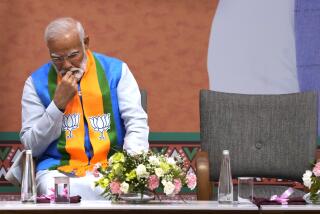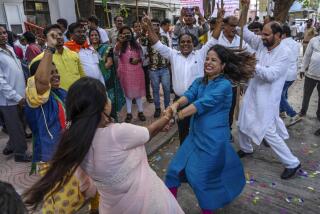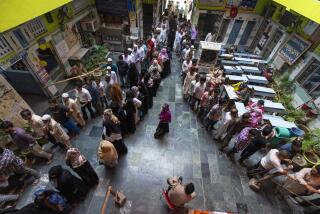Leader Blamed for Everything From Disasters to Corruption : India’s Opposition Tries to Unite, Oust Gandhi
- Share via
NEW DELHI — The lights went out briefly in the Indian Parliament this week, in a monsoon power failure that routinely plunges the Indian capital into darkness this time of year.
But that one minute of darkness underscored the current state of political affairs in the country today, as Prime Minister Rajiv Gandhi faces an increasingly powerful opposition that is trying hard to unite and unseat the third generation of Nehru family rulers from India’s political throne.
“This is the fate of our democracy,” one opposition legislator shouted, as members of Parliament automatically reached for their candles the moment the lights went out.
“The light of democracy has been put off,” another declared, to which a member of Gandhi’s ruling Congress-I Party shouted back, “Yeah, because of your unholy alliance.”
Alliance Formed
Although national elections will not take place for at least a year, the traditionally splintered and diverse political opposition sat down together two weeks ago and formed an umbrella alliance. Dubbing it the National Front, alliance leaders pledged to try to unify all of the major political groups opposed to Gandhi.
As a result of political heat generated by the alliance, every unfortunate happening has been promptly transformed into a alleged political failure for which Gandhi is blamed.
Gandhi, who will be 44 on Aug. 29, has been criticized by the opposition for failing to end an epidemic of cholera and typhoid that has left nearly 900 people dead in the past three weeks in New Delhi. Such epidemics are common during heavy monsoon seasons, like the one now drenching the capital each day, and Gandhi has gone as far as to fire his appointed governor for inaction. But his enemies in Parliament have charged that the cholera deaths “are on the prime minister’s hands.”
Last week’s ferryboat disaster in Bihar state, in which as many as 400 passengers may have been killed, was also blamed on Gandhi. The navy took more than five hours to respond to rescue calls after the overloaded ferryboat sank after striking a sand bar in the Ganges River, and Gandhi on Wednesday forced the resignation of the naval officer in charge.
The prestigious Times of India published a front-page cartoon that many of Gandhi’s political foes said sums up criticism of him.
The cartoon depicted a ferryboat, overloaded with Congress-I politicians, sinking in a river. Gandhi was pictured smiling mindlessly at the helm, and the boat bristled with buzz words hinting at many recent corruption scandals that have rocked his administration.
Assertions that Gandhi is failing because of incompetence and inexperience after 3 1/2 years in office are central to the criticism that has been buffeting his government.
Aloof From Politics
Gandhi, elected overwhelmingly in balloting held a month after his mother, Indira Gandhi, was assassinated in 1984 by her bodyguards, was an airline pilot and had been almost totally aloof from politics up to then.
His election victory was built on a vote of sympathy for his slain mother and on a longstanding perception here that his party, which was also that of his grandfather, Jawaharlal Nehru, remains the diverse nation’s most important unifying force.
At the time, supporters suggested strongly that like his mother--who had also lacked political experience when she first took office--Gandhi would grow into the job.
Critics now say that Gandhi has not followed in his mother’s footsteps, however.
“The feeling when Rajiv took over was: Here is Prince Charming, Sir Galahad and Camelot all rolled into one,” a well-known author, Kushwant Singh, said recently. “But he got surrounded by a bunch of thugs, and the result is the Indian nation simply isn’t moving at all.”
Gandhi nevertheless has acquired a prime ministerial image, and he and his supporters insist that this country has achieved much during his incumbency.
When a local newspaper interviewer asked him about a recent series of political defeats suffered by his party, including a by-election in the Nehru family’s ancestral home of Allahabad, Gandhi said:
“The temporary ups and downs are a part of political life. . . . I am not taking a complacent view. The by-elections have a message. . . . But I believe that the Congress-I party and its government have imparted a new direction to the economy and society.”
Gandhi cited a national growth rate of 2% last year, while India was in the throes of a devastating drought.
“We have spelled out the directions of change--vigorous use of science and technology to improve the conditions of living of our vast masses, modernization of our production structure,” he said.
His critics had a field day when, a few days after that interview was published, the power systems on India’s newest satellite failed in orbit above the subcontinent.
Yet the opposition will not have an easy task putting together a united challenge to Congress-I. Already, bickering has begun within its ranks, which are based on largely linguistic, regional or religious fundamentalist parties that are basically incompatible with each other.
And Gandhi, amid the tide of personal attacks against him, has responded with criticism of the opposition, relying on the traditional tenet that the Congress-I Party is the only glue that can hold India’s 800 million people together.
“Yes, some things have gone slowly, more slowly than I had wished,” he said in a recent interview. “But then, ours is a democratic society. We can only go forward by persuading people. At least we can say the direction has been mapped out.”
More to Read
Sign up for Essential California
The most important California stories and recommendations in your inbox every morning.
You may occasionally receive promotional content from the Los Angeles Times.













